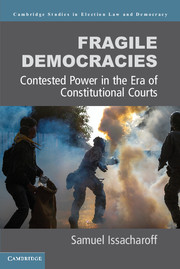Book contents
- Frontmatter
- Contents
- Preface
- Introduction: The Burden of Modern Democracy
- PART I MILITANT DEMOCRACY
- PART II COMPETITIVE DEMOCRACY
- 6 Giving Up Power
- 7 The Promise of Constitutional Democracy
- 8 Transition in South Africa
- 9 The Era of Constitutional Courts
- 10 The Constitutional Bargain
- 11 Can Law Protect Democracy?
- 12 Constitutionalism in the Time of Fragile Democracies
- Epilogue: Democratic Objectives
- Index
7 - The Promise of Constitutional Democracy
from PART II - COMPETITIVE DEMOCRACY
Published online by Cambridge University Press: 05 July 2015
- Frontmatter
- Contents
- Preface
- Introduction: The Burden of Modern Democracy
- PART I MILITANT DEMOCRACY
- PART II COMPETITIVE DEMOCRACY
- 6 Giving Up Power
- 7 The Promise of Constitutional Democracy
- 8 Transition in South Africa
- 9 The Era of Constitutional Courts
- 10 The Constitutional Bargain
- 11 Can Law Protect Democracy?
- 12 Constitutionalism in the Time of Fragile Democracies
- Epilogue: Democratic Objectives
- Index
Summary
On November 6, 1985, leftist guerrillas from the Colombian 19th of April Movement overran the Colombian Supreme Court building, taking the justices of the court as hostages. In the ensuing shoot-out with the military, twelve of the judges were killed, along with more than 100 other civilians. The shootings at the court were but the most visible signpost that the country's background of war and strife could overwhelm even the central institutions of state in Bogotá, the capital. Colombia was, for much of the last half of the twentieth century, a state struggling for control of its territory against powerful private militias, and the resulting loss of state authority left open the terrain for one of the highest murder rates in the world, pervasive extreme poverty, and a stubbornly flurishing drug trade. After a civil war that left more than 200,000 people dead during the Gran Violencia of the 1950s, and then the militant uprisings and drug wars of the following decades during which even more succumbed to violence, any prospect of peace and stability seemed nonexistent.
Yet in 1991, in the face of overwhelming odds, a democratically elected constituent assembly promulgated a new constitution that served as part of the “profound constitutional moment throughout the Americas.” The fall of military dictatorships across much of South America, most notably in Argentina, Brazil, Chile, and Uruguay, unleashed a democratic revival in the region and a new commitment to limitations on the powers of government. In many ways, the democratic surge in South America paralleled the broader democratic expansion in Eastern Europe and Asia following the fall of the Soviet Union. In each case, central to the desired democratic restoration was the idea of constraint in the exercise of state authority. Authoritarian rule allowed the direct translation of political power into arbitrary and repressive governmental conduct. In response, the democratic revival sought both to restore civilian authority and to enshrine the primacy of a rule of law.
- Type
- Chapter
- Information
- Fragile DemocraciesContested Power in the Era of Constitutional Courts, pp. 137 - 165Publisher: Cambridge University PressPrint publication year: 2015



